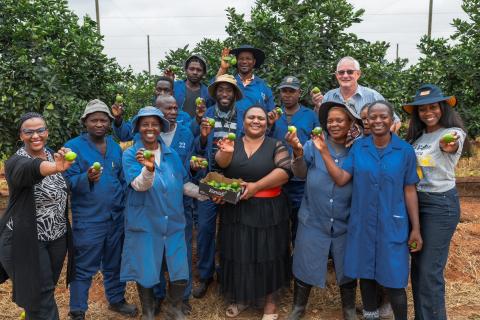
Johannesburg. 31 July 2019. The South African Breweries (SAB) is well on its way to sourcing 100% of all of its raw materials used in the brewing process from local South African suppliers. This has been instrumental in the business’ achievement of a Level 3 B-BBEE status, up from Level 4 which it hovered at for a number of years.
“We are proud to source just over 97% of all of our raw materials, including barley, hops and maize from local suppliers, many of which are emerging black farmers and other SMME businesses who we support and help develop through our intensive entrepreneurship and agricultural programmes,” says Zoleka Lisa, VP Corporate Affairs, SAB and AB InBev Africa.
A critical focus of SAB since the business combination between SABMiller and AB InBev at the end of 2016 is the radical transformation of its supply chain bringing the producer and consumer closer together and in turn helping to strengthen the local economy.
While SAB has been a forerunner for many decades in bringing local black suppliers on board, giving them access to market and empowering them through business support and development programmes, a more robust approach has been taken in recent years to strengthen these efforts.
“We are a proudly South African company and believe that this should be evident throughout our value chain. Through localisation of our business we are able to bring the producer closer to the consumer and in turn strengthen the local economy, a task that President Ramaphosa and his government have challenged the private sector to collaborate with them on,” says Lisa.
One of the greatest challenges faced by especially SMMEs in South Africa is their ability to adequately service big business in the country. Often overlooked by larger organisations, they are not given the opportunity to prove themselves as capable service providers.
SAB’s Entrepreneurship and Agricultural programmes are fundamental to supporting black-owned SMMEs. The business has committed close to R1-billion over 5 years towards these initiatives through its Public Interest Commitments (PIC) made to the South African government at the business combination. The R1-bn is over and above SAB’s efforts for more than two decades fast tracking the economic inclusion of black entrepreneurs in South Africa.
These programmes allow SAB to effectively move small businesses from ideation to growth and then transforming SAB’s supply chain.
“In South Africa, small businesses are important drivers of economic growth and transformation. We believe they are catalysts for real change in our society and what our national government wishes to achieve. As big business we need to take the lead in supporting and nurturing those local smaller businesses who show potential to support our success, always aware that we too were once simply a start-up.”
Through SAB’s localisation efforts the business does not merely identify appropriate local suppliers but helps up-weight their capabilities through comprehensive business support training, development and funding agriculture and entrepreneurship programmes.
“Investing in and developing local suppliers at all stages of existence is what enables us to accelerate our localisation strategy and move closer to the goal of 100% local,” says Lisa.
SAB’s transformation programme is not only limited to suppliers. Its R7.3-bn empowerment transaction, SAB Zenzele, has given part ownership of the business to close to 30 000 retailers across South Africa and helped transform the lives of some of the country’s most vulnerable, including people living in low income areas, people living with disabilities, youth and women, through the SAB Foundation. Introduced in 2010, SAB Zenzele transferred a total of 8.45% in SAB shares to three main beneficiary groups constituted of 40 000 previously disadvantaged individuals – SAB Employees, SAB Zenzele Holdings Limited which holds shares for the benefit of black-owned retailers and the SAB Foundation which supports entrepreneurship projects targeting local-income communities.



